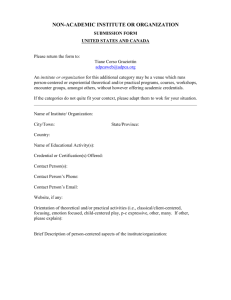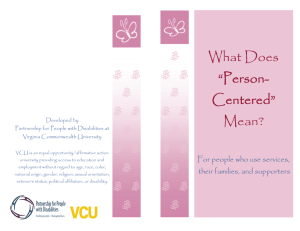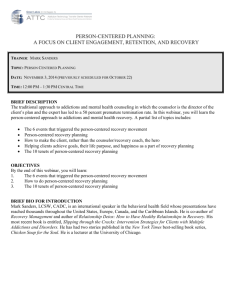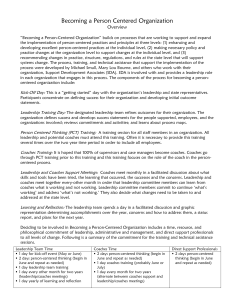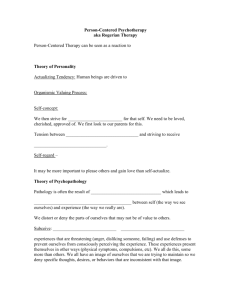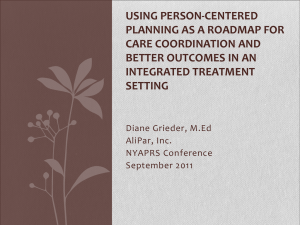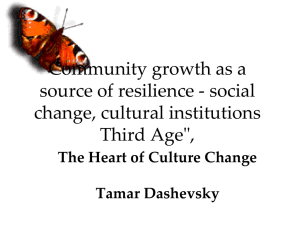Summary of Opportunity - Research and Training Center on
advertisement
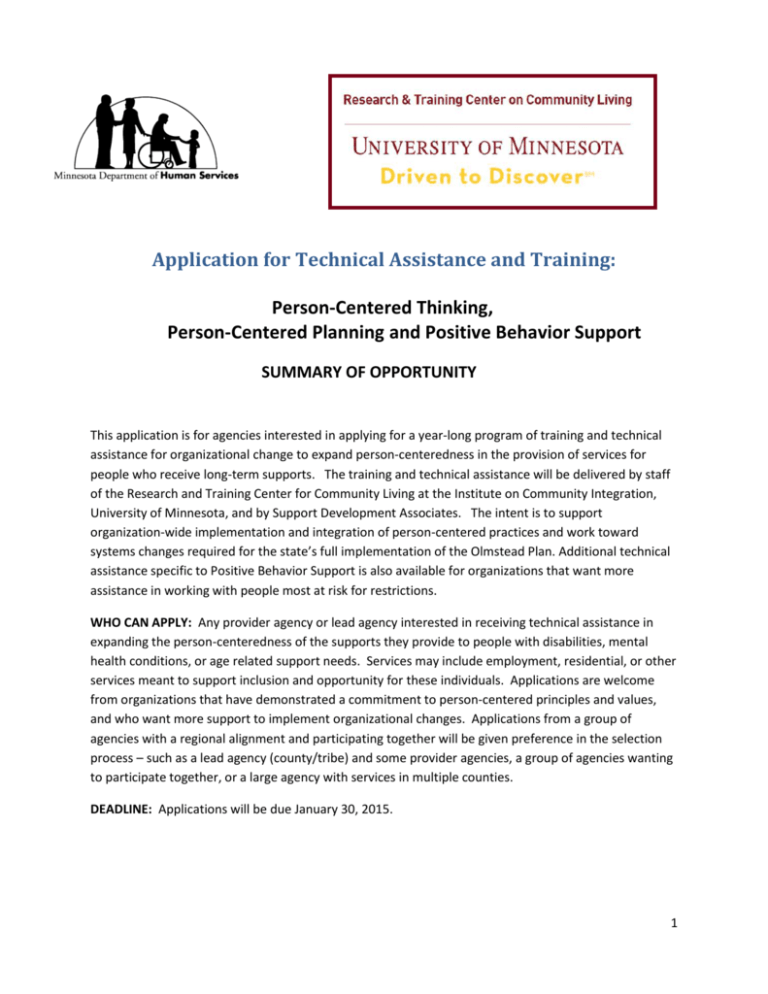
Application for Technical Assistance and Training: Person-Centered Thinking, Person-Centered Planning and Positive Behavior Support SUMMARY OF OPPORTUNITY This application is for agencies interested in applying for a year-long program of training and technical assistance for organizational change to expand person-centeredness in the provision of services for people who receive long-term supports. The training and technical assistance will be delivered by staff of the Research and Training Center for Community Living at the Institute on Community Integration, University of Minnesota, and by Support Development Associates. The intent is to support organization-wide implementation and integration of person-centered practices and work toward systems changes required for the state’s full implementation of the Olmstead Plan. Additional technical assistance specific to Positive Behavior Support is also available for organizations that want more assistance in working with people most at risk for restrictions. WHO CAN APPLY: Any provider agency or lead agency interested in receiving technical assistance in expanding the person-centeredness of the supports they provide to people with disabilities, mental health conditions, or age related support needs. Services may include employment, residential, or other services meant to support inclusion and opportunity for these individuals. Applications are welcome from organizations that have demonstrated a commitment to person-centered principles and values, and who want more support to implement organizational changes. Applications from a group of agencies with a regional alignment and participating together will be given preference in the selection process – such as a lead agency (county/tribe) and some provider agencies, a group of agencies wanting to participate together, or a large agency with services in multiple counties. DEADLINE: Applications will be due January 30, 2015. 1 A. INTRODUCTION AND BACKGROUND The Minnesota Department of Human Services (DHS) has entered into a formal agreement with the University of Minnesota’s Research and Training Center on Community Living at the Institute on Community Integration to provide professional technical assistance to promote person-centered services and the use of positive behavior supports. Some trainings are stand-alone opportunities available for any interested agency, separate from this application, and are described in Appendix A. The technical assistance opportunity in this application process is specifically for organization-wide implementation and integration of person-centered practices, and extends beyond training already available. DHS seeks partners and providers who want technical assistance and training in order to expand their organizational capacity to promote person-centered culture throughout their organization. The State continues its efforts in the implementation of Reform 2020 initiatives and the state’s Olmstead Plan, including the Home and Community-Based Services Standards (Minnesota Statute 245(D)), and the changes in the Minnesota Rule 9525.2700-9525.2700-9525.2810 to modernize what is commonly referred to as Rule 40 (Use of Aversive and Deprivation Procedures in Licensed Facilities Serving Persons with Developmental Disabilities). As part of these efforts, the Department wants to promote service planning and delivery that empower the people who receive services, provide staff with an expanded array of skills and competencies, and support agencies in undertaking the larger cultural shifts necessary in their organizational capacities. DHS hopes that this technical assistance will help create opportunities and choices that are not available today. WHO WILL BE SELECTED: In 2015 up to 4 individual agencies, or one group of up to 4 agencies, will be selected. (It is anticipated that another 4 agencies will be selected in a second year.) Selection will be made by DHS in conjunction with ICI staff. Applications will be reviewed and selections will be made based on an agency’s demonstrated commitment to person-centered practices, potential for regional partnerships, and need. Preference will be given to organizations that have had staff participate in the training already offered in Person-Centered Thinking and/or the Positive Behavior Support cohort training model currently being conducted through the University of Minnesota (described in Appendix A). Applicants who have not yet participated in any of this training but are interested in applying for the technical assistance in this application must be able to have staff participate in the PCT training at the beginning of implementation (http://rtc.umn.edu/pctp/training/) APPLICATION PROCESS: A brief application is attached in Appendix B and must be submitted by JANUARY 30. 2015. Two versions of the form are attached, either of which can be used: a word document which may be emailed or sent by mail, and a pdf which may be filled in and emailed. It is anticipated that project activities will begin in April of 2015. Potential applicants may be interviewed by phone before final selection. 2 Two call-in conference call information sessions will be held for questions and answers about this opportunity: Wednesday, Oct 29th, 1:00 p.m., 866-865-2157, pin 2271382843# Thursday, Nov 13th, 1:00 p.m., 866-865-2157, pin 2271382843# Questions about this application or the technical assistance that may be provided may also be directed to: Anne Roehl, Institute on Community Integration, vand0202@umn.edu, 612-310-4661 The application should be returned by email to vand0202@umn.edu or mailed to: Anne Roehl, Institute on Community Integration, University of Minnesota, Pattee Hall Room 212, 150 Pillsbury Dr. SE Minneapolis MN 55455 B. DESCRIPTION OF TRAINING AND TECHNICAL ASSISTANCE The year-long training and technical assistance will be coordinated by staff at the Research and Training Center on Community Living, Institute on Community Integration, University of Minnesota, with training and support provided by staff from both ICI and Support Development Associates (SDA). Three elements of support, training and technical assistance will be provided, with an additional fourth element available for those agencies requesting support in Positive Behavior Support. These are the elements and each is described more fully below: 1. An initial planning process to assess needs and align on goals and structure for the year 2. A year-long coaches and leaders’ training program 3. Technical assistance from a consultant from the University’s Institute on Community Integration throughout the year 4. Technical assistance in organizational change for Positive Behavior Supports (if requested) 1. INITIAL PLANNING PHASE Once selected, a set of surveys and interviews will be completed with an agency, to assess specific needs and establish goals for the year. Meetings will be held with consultants from SDA and from the University’s ICI. Part of the plan will identify what will be required to support management, administrative, professional, direct support and other agency staff both in planning for the program and in making changes throughout the year. The planning process will also include alignment on staff who will participate in each element of the program, and on participation plans for people who receive 3 services and families. If an agency is requesting assistance with Positive Behavior Support, the planning process will also be used to identify and align on what types of training or technical assistance will be most helpful in that arena. 2. PERSON-CENTERED ORGANIZATIONAL CHANGE: COACHES AND LEADERS TRAINING A year-long program of training internal agency coaches and leadership teams in methods of implementing person-centered practices at an organizational level will form the core of the training and technical assistance provided. This support is based on the opportunity for deep implementation of a unique approach to person centeredness called Person Centered Thinking and Planning, currently being delivered in the state. These trainings and the related technical assistance for organizational implementation have been developed by an international community of practitioners, led by Michael Smull of Support Development Associates. What makes Person Centered Thinking unique and different from other forms of person-centered planning is that it provides structured methods for the organizational and systems changes required for agencies to provide person-centered support. While individual practices, staff or beliefs may be person-centered, there are usually gaps in the integration of person-centered practices throughout an agency’s practices. Moving from particular strategies toward an agency’s full implementation and foundation as a person-centered agency usually requires sustained work and re-organization. Without such sustained and coordinated effort, person-centered practices never fully take hold and more challenging issues are not addressed. For example, one element of being a person-centered agency is that these ideas permeate all levels, including management practices, supervision, and staff’s relationships with one another, as well as practices with the individuals who receive services. Training in Person-Centered Thinking and Person-Centered Planning (“A Picture of a Life”) have already been available in the state. These are described more specifically in Appendix A, and form the foundation for the coaches and leaders training. The technical assistance offered in this application process builds upon and goes beyond these trainings already available, to train internal coaches and leaders for the agency’s implementation of these ideas and practices. Deeper assistance is provided to create more lasting change for the people served as well as for the agency and all its staff. These trainings will be delivered by Bob Sattler and Michael Smull of SDA, both of whom have extensive experience in organizational change, including supports for people with a label of “challenging behavior” or who are at risk of restrictions. This training: Is designed to provide support to a select few, key implementers and leaders. Develops and trains internal coaches, individuals who have the passion to support the implementation of these practices agency-wide as part of their role. Provides training to an agency Leadership Team, who have an essential role as champions for change, including those who can implement the specific organizational changes that coaches identify as needing as they support the implementation of PCT. 4 The coaching and leadership training is a year-long process. Coaches meet once a month for full day training. In alternate months, the coaches’ training consists of meeting together with the leadership teams for full day training regarding integration of person-centered practices and addressing barriers which arise. (Coaches commitment: one day of training a month for 12 months, Leadership team: one day a month for six alternating months.) Both coaches and leaders must also address on-going daily or weekly implementation of the changes identified as needed or desirable, for the people who receive support, for staff with one another, and with management. Members of an executive leadership team also receive training, including an introductory day and periodic participation in organizational change meetings. After an agency is selected through this application process, the plan that will be made with each agency will include identification of specific staff participation in PCT training, PCP training, developing internal PCT trainers, and participation in coaches, leaders, and executives’ training. 3. AGENCY-INDIVIDUALIZED TECHNICAL ASSISTANCE A consultant from the University’s Institute on Community Integration (Research and Training Center on Community Living) will assist in the development of the plan and support the implementation of the individualized agency plan throughout the year. They will work in conjunction with the organization to maximize the implementation of the person-centered practices identified and planned in the coaches and leaders’ trainings. The ICI consultant may also coordinate support to an agency in additional activities such as participation in local communities of practice, engaging enhanced positive behavior support practices, and involving families, people supported and others in participating in changes. Technical assistance may also be provided to agencies that are participating together in a coordinated, regional effort regarding shared efforts or issues. If applicable and desired, organizations may also be supported to utilize other opportunities offered through the University’s Institute on Community Integration, such as online curriculum modules offered through DirectCourse which are focused on 245D, other person-centered practices, and other state and federal initiatives. An agency which has requested assistance in Positive Behavior Support (as described next in # 4) will also receive support from an ICI consultant in these areas. 4. DESCRIPTION OF TECHNICAL ASSISTANCE FOR POSITIVE BEHAVIOR SUPPORT The three areas above stand by themselves, but organizations may also apply for additional technical assistance specific to Positive Behavior Support. Any agency may apply that wishes assistance regarding support for individuals who engage law enforcement or crisis services, currently require emergency use of manual restraints, or people who have or need Positive Support Transition Plans. An agency may also apply for this assistance if they are not currently supporting such individuals, but are willing to do so. Positive Behavior Support works in conjunction with Person-Centered Thinking and Planning, and also requires systematic organizational change for those individuals who require such support. Positive 5 Behavior Support (PBS) is a set of research-based strategies used to increase quality of life and decrease problem behavior by teaching new skills and making changes in a person's environment. It combines valued outcomes, validated procedures, and systems changes to enhance quality of life and reduce problem behaviors. There are several different forms of training and technical assistance for Positive Behavior Support for which an agency may apply, and which will be aligned upon in the planning process in # 1 above. The application should indicate the agency’s specific requests for assistance, and additional needs may also be identified and/or clarified during this planning phase. First, an agency participating in the PersonCentered Organizational Change Coaches and Leaders training (#2) may also have staff participate in the Positive Behavior Supports Intensive Training Cohort described in Appendix A. The ICI consultant will assist with the coordination of practices and organizational changes between the two trainings (cohort and coaches/leaders trainings). Secondly, an agency that has had staff participate in the Intensive Training Cohorts in the past can request additional assistance in the organizational changes needed for full implementation and integration of Positive Behavior Supports into the agency culture. Other forms of assistance may include support with such practices as data collection, PBS management practices, or other identified needs. Technical assistance may be provided to the inter-disciplinary teams of the individuals who require such shifts toward positive support. Lastly, an agency may not be currently supporting individuals at risk of restriction, but be willing to do so with additional assistance in implementation of Positive Behavior Support practices. C. LEVEL OF COMMITMENT A critical mass of agency staff will be expected to attend the two-day Person-Centered Thinking training (Appendix A), if they have not already. Coaches must commit to meeting monthly, and leadership team members must attend trainings every 2 months. Coaches, leadership team, and executives must all commit to implementing the changes that become identified during the planning and implementation phases. Agency executive leadership must be committed to training some of their own members in PCT, participating in organizational assessments, attending periodic meetings to problem solve, supporting resources for this initiative, and establishing a leadership team. If an agency is requesting support in Positive Behavior Support, agency leadership will also be expected to assist in the implementation of the organizational culture changes needed. Families and people supported along with local community members and affiliated support organizations will also be encouraged to participate in training activities. Other opportunities specifically aimed at families and individuals who receive support may be designed or offered during the program. In addition, some staff may be expected to attend Person-Centered Planning training, depending on the agency’s individual organizational change plan. Organizations may be encouraged to and can be supported to train individuals in becoming internal or regional PCT or PCP trainers, and participate in local or regional communities of practice concerning PCT and/or PBS. Participation in 6 these trainings and activities will be determined during the planning phase, based on the size and focus of the agency. D. APPLICATION CRITERIA An individual provider agency may apply, or a group of agencies may apply together, including a county or tribe (lead agency) with one or more provider agencies. An agency may apply for this training and technical assistance to focus on Person-Centered Thinking and Planning, and may not necessarily be dealing with issues requiring Positive Behavior Support. An agency may also be primarily concerned about issues of supporting individuals at risk of restrictions and wish to apply through this process for assistance in creating person-centered services for these individuals. The following criteria are desirable, will be considered in selection, and should be used a basis for developing the application. Note that an agency may apply even with limited experience in the listed areas. The most important criteria are an agency’s desire to change their own programs and practices to realize organizational change and influence systems change; and their willingness and capacity to have the resources available to complete the training and technical assistance activities at all levels. Selection will be based on the overall strength of the application with consideration given for the following criteria: 1. Organizations that have a track record in implementing person-centered thinking and practices to make a difference in the lives of the individuals they support, including a track record in making or wanting to make organizational changes needed for those changes; organizations with a strong, mission-driven desire to improve services and systems 2. Organizations that have clearly identified champions, supporters, and committed leadership for person-centered supports 3. Organizations that have had high proportions of their staff engage in PCT or PCP training; have developed, hired, or want to develop internal PCT or PCP trainers; and/or who have graduates or current participants in the PBS cohort model 4. Organizations that have the capacity to implement the coaches and leadership team structures and all aspects of the identified training and technical assistance plans 5. Organizations that are willing to and have resources to send employees to PCT trainings before engaging in the coaches and leadership training, as needed. (PCT two day training is required for key employees prior to or at the start of the coaches and leadership training.) 6. Organizations that are serving people who are at risk of restrictions, experience emergency use of manual restraints, and/or are working on Positive Support Transition Plans 7. Organizations that have a coordinated plan to include the people they support in this effort, or have peer leaders or have hired peer specialists who can be involved 8. Organizations that support people from more than one service population (MH, IDD, Aging, BI, etc.) or setting (employment, residential, crisis services, day services, etc.) 9. Organizations that provide bi-cultural or multi-cultural services. 7 Applicants who are ready and enthusiastic to engage in dialogue that supports on-going system change which includes: 1. Providing honest, positive, and proactive feedback to DHS and ICI regarding what’s working/what’s not working regarding the training and technical assistance, regulations, and other aspects of the system, including recommendations for systems-wide changes in rules, statues, funding, or policies; 2. Willing to meet periodically with and share stories and challenges with others in the organization and with those outside the organization 3. Willing and able to apply ongoing resources to necessary activities related to the training and technical assistance outside of training days (such as daily, weekly, and monthly implementation of new practices; revision of policy or procedures, etc.) 4. Willing to share learning through a community of practice, presentations, and/or mentoring others internal and external to the organization. Preference to regionally/geographically tied organizations will be given. Each year all agencies participating together (2, 3, or 4 agencies participating together) must be able to travel to the same central location for many aspects of the training and technical assistance. (Note: Centralized locations for trainings will be determined based on the final selection of participants.) Preference to a county/ provider mix will be given (e.g., a county/lead agency and 1, 2, or 3 providers within that county) or a provider with services in many counties Applicants who are not part of the four selected each year may still be able to engage in targeted aspects of training (Appendix A), or participate in future years, and will be informed of these and additional opportunities during the reply period. F. APPLICATION REVIEW PROCESS A review committee of DHS and ICI staff will review all applications and award up to 50 points based on the first three criteria. Additional consideration will be given to applications meeting the last three special criteria below. 1. Demonstrated commitment to person-centered supports: 20 points 2. Agency’s capability/capacity to fulfill on the project structure and intention: 20 points 3. Participation of families and people who receive services: 10 points ADDITIONAL CONSIDERATION WILL BE GIVEN FOR THE FOLLOWING SPECIAL CRITERIA: 4. Collaboration with a lead agency in the region, or with other agencies 8 5. Willingness to support people at highest risk of restrictions (even if not currently doing so) with capacity/commitment to fulfill PBS best practices 6. Capacity to impact multiple diverse groups or services, including different service populations, bi-cultural or multi-cultural services, or a variety of types of services provided Final selection will be based on a balance of applicant scores, special criteria, scope of impact, and determination of the best mix of agencies for participation. 9 APPENDIX A Trainings Already Available Separate From This Opportunity Note that agency staff and others may participate in a wide variety of training opportunities already available through the DHS contract with the Institute on Community Integration. An agency may have staff, families or individuals who receive support, attend and utilize any of the following apart from the technical assistance organizational change package available in this opportunity: A. Person-Centered Thinking training: two days of interactive training for acquiring and practicing effective person centered thinking skills, centered on how to discover and balance what is important to and what is important for a person. These approaches respectfully address issues of health and safety, from a variety of perspectives, while empowering the people served to maintain a sense of being listened to and having control. Participants learn to write a Person Centered Description. Designed for the largest amount of staff to participate, especially for assessors, case managers, supervisory staff and full time staff who continually interact with the people served; staff in any role in the agency may participate, as well as individuals who receive support and families. B. Person-Centered Planning training: two days of learning and applying person centered planning tools that are focused on helping people envision the life they want in their community. Multiple methods are applied to capture what a person really wants and create a “picture of a life” that contains all the elements of that person’s desired future. The “Picture of a Life” method can help teams increase creativity and facilitate more satisfying and effective planning meetings. Designed for key staff to participate. This is especially for managers and those who write or supervise the writing of support plans. C. Developing internal Person-Centered Thinking/Person-Centered Planning trainers: for agencies with a large number of staff or who desire the ability to easily continue their training of incoming staff and/or want to lead the training for others. Trainee time is required for the certification process, including observing, practicing, and being observed leading the 2-day training. Note: Individuals who receive support, family members, case managers, and others from related agencies may also be invited to participate in any of the above. 10 D. Positive Behavior Support Intensive Training cohorts Participation in Positive Behavior Support Intensive Training cohorts is available through an individual application process from individual staff members. The intensive cohort training is for staff members who are involved with staff training and development of plans (i.e. Frontline Supervisors of Direct Support Professionals) and who are supporting staff members involved with individuals who may be more challenging to serve in the community. It is built from a person centered foundation and designed to provide hands-on training and ongoing support for implementation. This year-long competency-based training includes independent online work and 9 day-long class meetings, and requires participants to demonstrate competence by completing a case study and developing a project to internally implement the changes needed. Each participant receives 1:1 on-site coaching and feedback from a mentor. E. College of Direct Support/Direct Course: Online learning lessons that may be used as introductory content for new staff, for part-time staff, or learning in new topics for current staff. Dozens of lessons are available in many different topical areas. Staff time required for taking the lessons can vary depending on the length and number of lessons; supervisor time is also required for monitoring and follow-up. RESOURCES: Further information about these trainings is available at: 1. Registration for Person-Centered Thinking and Planning: http://rtc.umn.edu/pctp 2. Person-Centered Thinking: http://sdaus.com/final/wp-content/uploads/SDA Person-Centered Thinking-Training.pdf 3. Person-Centered Planning: http://sdaus.com/final/wp-content/uploads/SDA Picture-of-a-life-training-description.pdf 4. PCT Coaches training: http://sdaus.com/final/wp-content/uploads/Coaches-overview-2012.pdf 5. Positive Behavior Support: http://rtc.umn.edu/cpcsd/positivebehaviorsupports/ 6. College of Direct Support/DirectCourse: http://directcourseonline.com http://directcourseonline.com/directsupport/ Nancy McCulloh – 320-253-5661, mccul037@umn.edu 11 APPENDIX B Application for Technical Assistance and Training: Person-Centered Thinking, Person-Centered Planning and Positive Behavior Support (this is a word document – use as much space as you wish to respond; separate pdf application form may be used instead) Agency Name___________________________________________________________ Name of contact person for this application: _______________________________________ Phone _______________________________________________ Email: _______________________________________________ 1. Are you submitting this application in conjunction with any other agencies? If so, please tell us which agencies: Note: each agency must submit its own application. 12 2. What is your agency’s mission? Please provide a brief description of your agency and the types of support you provide. 3. Number of people your agency serves ______________ What particular populations (types of disability, elderly, etc.) does your agency serve? What is the range of bi-cultural or multi-cultural supports you provide? 4. Why are you applying for this training and technical assistance? Please provide a brief description of your agency’s goals: how to do you want to use the training and technical assistance to support your agency’s work? What are you struggling with? How do you want to develop and/or improve the quality of person-centered supports you provide? What will be the benefits to the people you support? 5. What aspects of the support you provide do you consider to be already person-centered? (What are examples of changes for people you support, and/or organizational changes you have implemented to be more person-centered) 6. Who will be the point person or lead for your agency efforts? Please provide contact information. 7. What is your willingness and capacity to commit staff and leadership time to these efforts? 8. If you are applying in cooperation with other agencies, how do you see the coordination working? What is your plan? 13 9. How would you include people who receive support from your agency and their families in these efforts? 10. Please provide: ______ For provider agencies: Number of Direct Support Professionals in your agency ______ For lead agencies (counties/tribes): Number of case managers, total of county-hired and contracted _____ Numb0er of staff who have attended 2-day Person-Centered Thinking training ______ Number of staff who have attended 2-day Person-Centered Planning training (Picture of a Life) ______ Number of staff who have or are participating in training to lead Person-Centered Thinking workshops ______ Number of staff who have participated/are participating in the Positive Behavior Supports Intensive cohort training ______ Number of individuals receiving support for whom you have developed or are developing Positive Support Transition Plans ______ Number of persons supported who are trained as Peer Specialists 14 11. Does your agency also request additional support for training and technical assistance for Positive Behavior Support? Yes __________ No ___________ If yes: (a) What is the status of your implementation of Positive Behavior Support? (for example, describe your efforts to implement Positive Behavior Support, and what successes or barriers you have experienced within your organization) (b) If you are not currently supporting individuals who are at risk of restriction are you willing to do so? What support do you need? (c) Please provide a brief description of your goals for PBS assistance, and what types of support you are requesting: PLEASE SEND THIS APPLICATION by mail or email to: Anne Roehl, Institute on Community Integration, University of Minnesota, Pattee Hall # 212, 150 Pillsbury Dr. S.E., Minneapolis, MN 55455 Vand0202@umn.edu, 612-310-4661 15
